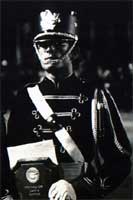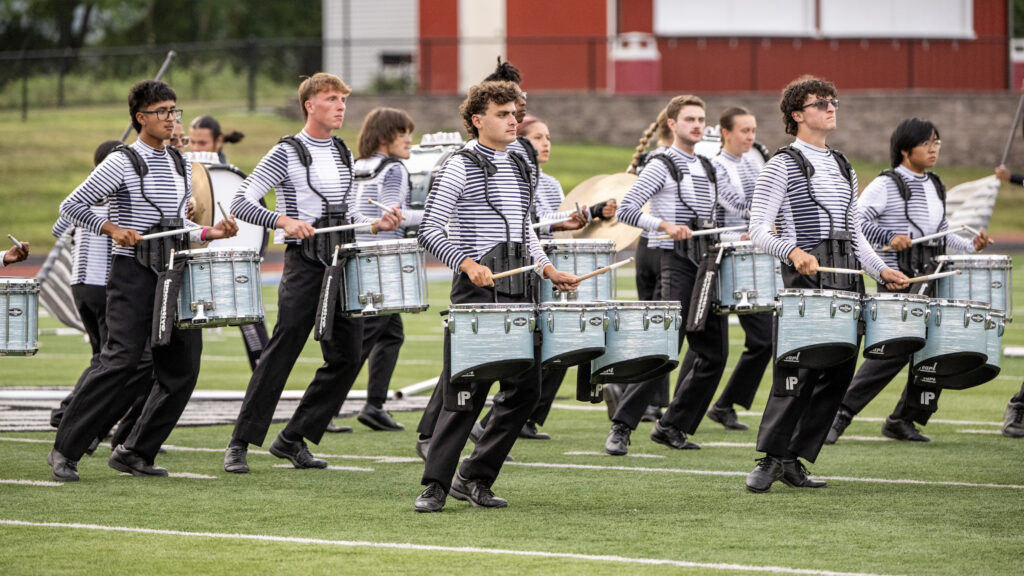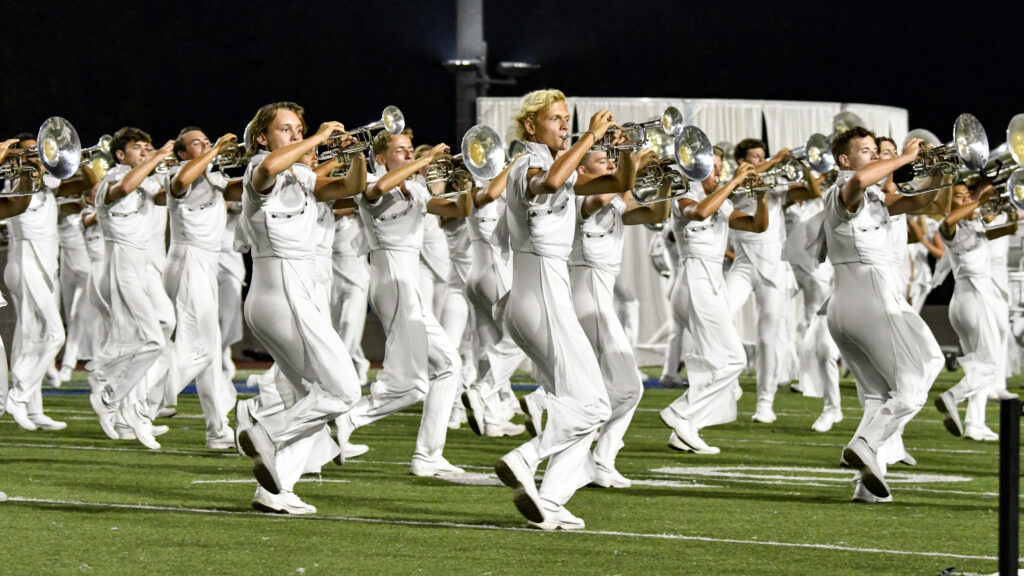Each weekday before the DCI 2005 Classic Countdown, we’ll be running first-person accounts of the seasons and the shows that will be featured in that event. Here’s the second installment: By Garrison Kean
My name is Garrison Kean, and I was drum major of the 1974 Anaheim Kingsmen. My co-major that year was David Bandy, and our guard captain was Patti Williams. Where are you, Patti?

I joined the Kingsmen in 1968, and when I told them that I played French horn, they handed me a hunk of chrome that looked like part of the bumper from my ’55 Chevy. We were practicing inside a classroom at Westminster High School and the echo of the horn line was so intense that my ears started ringing. To this day, the constant ringing in my ears reminds me of the Kingsmen. Yes, I hear blue people.
I recently read about a legend that says that our corps members would eat hubcaps just to toughen up. That is simply not true! We ate nails for breakfast, peanut butter sandwiches for lunch, and the competition for dinner. I really enjoyed calling the corps to parade rest. Nothing compares to the sound of a chrome horn slamming into a chrome buckle. And I know that they enjoyed it too.
I remember that Bobby Hoffman got tired of yelling “Yo drummers!” to get their attention, so I did it for him. It was the least I could do for a great man whose marching staff would carry the drum major podium out to the competition field for me. It was actually a 4X4 foot wood box that echoed like a bass drum when I marched on it. Was that the invention of the first pit?
Bobby’s new style of choreographed drill was pretty cutting edge for its time. We were spread out all over the field. Thank you Bobby!
Kit Squires arranged a kick-butt version of “Mambo” from “West Side Story” for us that year. Kit was a great piano player, but he had no concept of how difficult his arrangements for brass were. If you heard us play it at the beginning of the season, you would have puked. By breaking it down note by note and performing the show at a slow tempo, we were able to rapidly improve our performance so that we could crank up the tempos in time for the big shows. Our guard, known for their precise timing and snap, found the rhythmic complexities of “Mambo” to be extremely challenging. For that matter, the whole corps did. But eventually, it all came together beautifully, and it was a lot of fun to perform.
I think that our 1974 DCI World Championships performance was much better than our prelims performance, which is the one on the ’74 DCI DVD. I wonder what happened to the finals video? Unfortunately, the production you will see of our 74 DCI prelims performance doesn’t show the guard work on the 50-yard line during the “Tubular Bells” drum solo. Years later, other guards used the same effect with their shows. Remember the Rockford files? Our guard was so closely placed on the 50, that early in the season they lost some plumes when they tilted their heads back for the toss. But after countless hours of practice, they nailed it. Personally, I miss those authentic English riding boots!
Hector Berlioz wrote, “Time is a great teacher. Unfortunately, it kills all its pupils.” I think it is ironic that the time it took to get Kit’s arrangement of Berlioz’s “Symphony Fantastique” up to a competitive performance level almost killed us. I enjoyed the challenge to perform this music. I love the antiphonal brass parts and the awesome tone cluster that leads into the drum solo. And if you listen close, you can hear the horns growl.
My conducting classes at Cal-State Long Beach gave me the idea to use a 16-inch conductor’s baton during our performance of Stan Kenton’s “Artistry in Rhythm,” our concert number. I’m not sure if it helped, but I could throw it 20 feet and make it stick straight up in the grass. Steve Beard played the baritone solo in this tune, and he had a beautiful tone quality that I think is unique to him. He’s a legend in his own mind. Just kidding, Steve! This arrangement had some of the richest chord progressions that I have ever heard. Way to go, Kit!
Our final song, “So Very Hard To Go,” couldn’t have been more appropriate for both the corps as a whole, and for those of us who aged out. This was the last show that the Kingsmen ever performed at DCI Finals. This Tower of Power tune was a total kick to play. Ron Cain did a great job on the soprano solo. It transitioned into the final push of “Firebird,” which brought the audience screaming to their feet. It was an amazing sight emblazoned in our minds, and it made it worth all the time and hard work that we had put into the ’74 season.
We have a corps motto on our coat of arms: “Spectemur agendo,” which means, “Let us be judged by our actions.” The traditional definition of this is, “What you do defines who you really are.” To the early Kingsmen who helped create DCI, this also meant that we were looking for a fair judging system. In my quest to help the corps get ready for a show, I would sometimes yell out, “Winning isn’t everything, it’s the only thing!” This variation on Vince Lombardi’s theme has deep roots that need to be watered. And after all that yelling, I’m feeling thirsty.
Being a member of the ’74 Kingsmen was one of the best experiences of my life. It was an honor to be in front of a great group of talented and dedicated people who worked very hard on an extremely difficult show. The experience of both our staff and our members was a huge factor in our rapid rate of improvement. We gained over 21 points in two months against overwhelming odds, and we re-established ourselves as contenders for the DCI title. The memory of the intense focus and the ability to achieve so much in so little time remain with me to this day. I truly believe that I am a better person because of my experience as a member of The Anaheim Kingsmen.
Anyone interested in finding out more about our history can find it at http://xKingsmen.com .
May your corps always outlive you and may you always live with the spirit of your corps.
Garrison Kean
.
Jim Whobrey sent in some percussion-specific comments about the 1974 Kingsmen:I marched in the tenor section of the 1974 Kingsmen drum line. We had a lot of hopes going into the ’74 season, having just come off a disappointing sixth place at 1973 Finals.
In ’73 it felt like we had targets on our backs, since the corps had won in 1972.
In ’74 we now had a new group of veterans, completely new show and the mindset we could win it all with this show.
I remember when the staff announced that we would be playing “Symphony Fantastique” by Hector Berlioz. We all ran out and bought the symphony recordings and started listening to the two tunes we would use – “Dream of the Witches Sabbath” and “March to the Scaffold.”
How cool! “Dream of the Witches Sabbath.” Although never referred to by that name, it was still too cool to us.
With “Mambo” from “West Side Story” as an opener, we knew what we were in for — a high-energy, difficult, uptempo show.
Throughout most of the first tour, we suffered in the execution captions. We came back to California and did 12-hour rehearsals seven days a week.
One good fact from first tour was that we were no lower than third in percussion and only a few 10ths out of first, and we hadn’t really started cleaning yet. So we knew the drum line was going to contend for the top spot.
Second tour, the Kingsmen and Santa Clara constantly battled in the percussion caption, with the Muchachos slipping in the top two a couple times.
The brass started to clean, the drill improved, and we finally started scoring well. The tempo of the show got a little faster each day. We knew this show had to be very up tempo to work.
Looking back 30 years on that season, it was very difficult, but at the same time, fun and very rewarding. We knew we had broken new ground and made a lasting mark in the activity. And we knew we had a shot at the top placing just a few tenths out of first.





